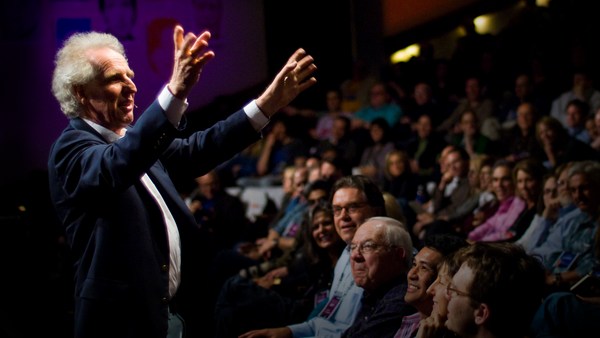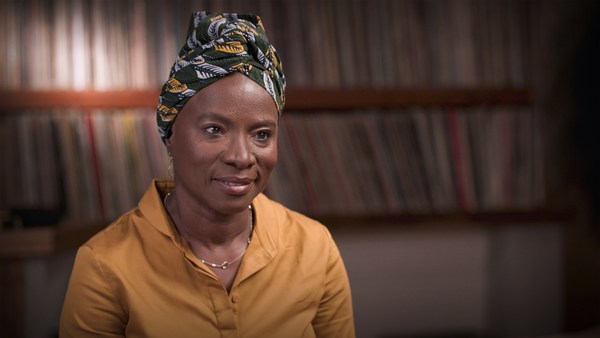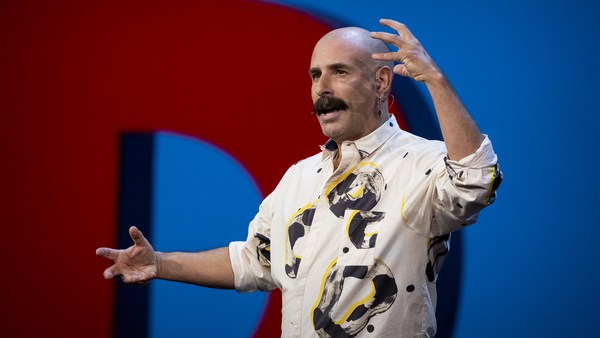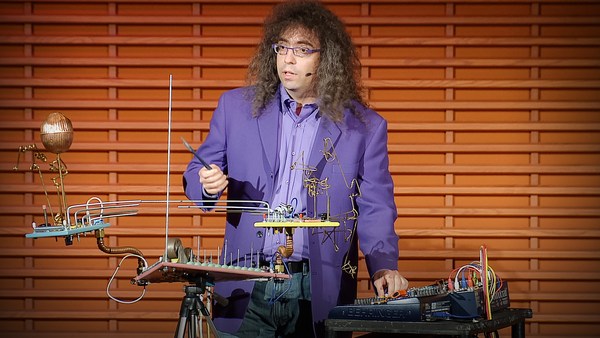One of the things I've noticed is that people get confused about the difference between possibility and positive thinking, and I thought I would just spend a moment on that because it's worth eliminating that confusion. I'm going to tell you a story which will give you clarity about that forever.
My father was a refugee from Nazi Germany. He lost his mother in the death camps, and eight other members of his family, lost everything that he had. And he came to England to set up life. And then, at the height of the war, he was interned, as the Japanese were here. And so he found himself on the Isle of Man with 2,000 other men, all of them in a state of shock and fear and anxiety and loss. And he looked around and said, "There are a lot of intelligent people here. We should start a university." And so they did. And they had 46 classes a week, and there was no paper or pencil or blackboard or chalk, just people talking to each other. And that is possibility.
If he'd gone around saying, "Isn't it great here?" Somebody would have hit him in the face.
(Laughter)
Because positive thinking is pretending things are good when you know they're shitty. Which is why positive thinkers are so irritating.
(Laughter and applause)
Positive thinking is a fraud.
(Laughter)
And possibility is a language of creation.
And I want to tell you a little story about that which happened to me. I was at Merrill Lynch, and there was a conversation going on about how they could be the best in the world. And one of the vice presidents spoke up, and she said, "Why can't we talk about what could be the best for the world?" And suddenly at that moment, the whole conversation shifted into possibility.
So possibility is a discipline and very much a discipline in language. It's a rigorous discipline to keep the story and the ideas and the way of being, which is possibility.
The greatest example of a possibility person that I know of in music is Beethoven. Beethoven was deaf. He was ill, he was suicidal, he was alone, he was depressed. And he wrote some of the most affirmative music that has ever been written. And it's almost extraordinary to think that somebody who is in that state of despair could write --
(Vocalizing)
(Playing Beethoven, vocalizing)
How can you resist that?
(Laughter and applause)
Try.
(Applause)
So Beethoven also taught us. He taught us really, that there is always a path to triumph, even from the darkest despair. That's something that we've actually learned from Beethoven. And he also has taught us that it's much more than the notes itself. It's how you play them.
Most of you have heard, probably innumerable times and possibly even played.
(Playing "Moonlight Sonata" by Beethoven)
And although those notes are beautiful in themselves, it isn't until you make shape, until you make a line with the music that it starts to come alive. And like a bird who flies over the fields, the birds do not care about the fences that keep the sheep in their place.
But it's the same with music, that if you understand that that is merely an accompaniment in the right hand, and the left hand is doing something very different.
(Playing piano)
How would it be if we just sang that together?
(Vocalizing)
Do you notice that the last note is connected to the first note? They are like pillars with an arch above them. So let's do it one more time and hear those two notes from the beginning and the end, linked together.
(Vocalizing)
Now, if I put the right hand together with that, it's --
(Playing “Moonlight Sonata” variation)
It becomes a completely different piece. Isn't that lovely?
(Applause)
Isn't it wonderful that whatever state you're in, and I imagine at the end of a long day like this, you're actually quite tired. And yet when Beethoven speaks, the calmness is uplifting.
Leon Fleisher, the great American pianist, said: “Classical music is an act of anti-gravity.” And Beethoven had that capacity. And if you feel that inside your body --
(Playing piano, vocalizing)
Interestingly enough, you know, Beethoven didn't call that a "Moonlight Sonata." He called it “Sonata quasi una fantasia.” It was the publisher who thought he would make more money if he called it the "Moonlight Sonata." And people thought, oh, well, if it's the moonlight, then surely one ought to be in this state.
(Playing piano)
(Laughter)
It's just good in possibility to rethink whatever our habits are, whatever we take on from tradition, and reinvestigate everything that we approach and see.
So now what we're going to do, and this is very exciting, we’re actually going to sing the Beethoven 9th in German.
(Laughter)
Now I say that with such confidence because I know that you can all sing, because everybody loves classical music. Many people haven't found out about it yet, but there isn't anybody who doesn't love this music. And Beethoven managed to write a piece that the whole world has embraced -- out of that despair, out of that sense of restriction that he had in his own personal life. He wrote the most affirmative music that anybody has ever written, and it's known all over the world. So we're going to have the pleasure of learning the piece and performing it. So from the beginning, everybody together.
(Reading lyrics to "Symphony No. 9" in German)
Well, you know the song. Let's sing it.
(Playing “Symphony No. 9”)
(Singing)
Wonderful, great job, fantastic.
(Applause)
I was watching you while you were reading, and a lot of you are going --
(Speaking German)
What Beethoven wanted was what I call a “one-buttock line of music.” You see, in order to play music in a musical way, you have to allow yourself to go on to one buttock.
(Playing)
(Laughter)
It's so beautiful. Actually, I have it here. It's the most beautiful phrase by Gustav Mahler. He sent a love letter to his beloved, Alma. And she received it. She was a musician, so she could hear it. She didn't need to read the letter because it was in music. So she heard it. And this is what it said.
(Playing, vocalizing)
And she said, "He loves me."
(Laughter)
And she sent a message to him, said, "Tell him to come." And they got married, of course, because when you hear that,
(Vocalizing) I love you, darling. Don't ever leave.
Of course, it doesn't have words, it doesn't need words. The music is much more expressive than any words could be. So we call that one-buttock playing.
So what I want to suggest here is that instead of going --
(German)
We get what I call a one-buttock line of vision, like Beethoven had in mind, like this.
(Singing in German)
Now I'm in the wrong key. Just a moment.
(Singing in German)
Try that now.
(Audience singing “Symphony No. 9”)
Sounds gorgeous. Now, it sounds a little bit to say you're not quite sure what you're singing about.
(Laughter)
So let me tell you. “Freude” is “joy,” "schöner" is "beautiful," "Götterfunken" is "God-like shining bright light." OK, all in one word, "Götterfunken." "Tochter aus Elysium" is "daughter of heaven." "Wir betreten" is "we stand," "feuertrunken" is "drunk with fire." "We stand drunk with fire at your heavenly holy place," "Himmlische, dein Heiligtum."
That's the first part. Now comes the most important part. "Deine Zauber," says the poet Schiller, speaking to God. "Your magic," says the poet, "your magic binds together." “Was die Mode streng geteilt,” "what habit and fashion has torn apart."
Now, what the poet is saying is our habits, our fashions, our preconceived ideas, our assumptions, our addiction to being right, all the things that stand in the way of possibility prevent us from accessing the true vision that Schiller and Beethoven were bringing to the world, which is “Alle Menschen werden Brüder,” “All human beings will be as brothers,” right? It's only if we take care of those assumptions and resistance, and that, as what I call the addiction to being right and the preconceived notions and all the things that we're addicted to. If we can give that up, we can have this vision of “Alle Menschen werden Brüder,” “All humans living together.”
And the final line is, “Wo dein sanfter Flügel weilt” which means “where your soft wings [abide].” So this is the song to the possibility that human beings are.
So now knowing that, would you please stand?
(Laughter)
And if you're all excited about the possibility that human beings are, could you inform your faces about it, please?
(Laughter)
Are you ready?
(Singing)
Yeah, now you know, you're doing great. You're doing great. You're doing great. But I hear some serious holding back in this room.
All right, so I want to tell you a story. A student of mine at the New England Conservatory came to see me in my home because he had a very important audition. He wanted to be the associate principal cellist in Barcelona, which was the town he came from. And so he came to play for me, and he played very well. It was excellent playing. I said, "Marius, you're a wonderful cellist. I'm sure you'll get into the orchestra, but I don’t think you’ll make the leadership role. Because to be a leader, you have to open up possibility for people they don’t even know about, and you're not doing that." And so I went to the piano, and he started playing and gradually, his hair began to, sort of, and his sweat began to pour. Finally I said, "Marius, you play that way, they won't be able to resist you." So then, at the end of the evening he left, and he went home. And I said to him as he left, I said, "Marius, when you go to the audition, don't play the first way."
"No, I play second way."
So off he went. Came back three weeks later and I said, "Marius, how did it go?"
And he said, "I didn't get the job."
I said, "Never mind."
"No, no, no, wait," he said, "you haven't heard the whole story." And then in his heavy Spanish accent, he said, “I was so pissed off, I said, ‘fock it’” he said.
(Laughter)
He said, "I'm going to go to Valladolid," which is a town in Spain. He said, “I played the audition for that orchestra, and I won the job. Twice the salary of the other job."
(Laughter)
I said, "What happened?"
He said, "I played the second way."
So we introduced a new phrase into my teaching world, which all my students know, including the little ones. And it’s: “beyond the fock-it.”
(Laughter)
Beyond the fock-it, right?
(Applause) I went to a Catholic girls school in Monterey, and I gave a talk there. And the headmistress, Sister Carlotta, she wrote me, "BTFI has become our school motto."
(Laughter)
So this is what I want to invite you to do. One more performance. And Beethoven is telling us to sing with all our heart. BTFI, are you ready?
(Singing in German)
Bravo!
(Applause and cheers)
Bravo!
(Applause)





